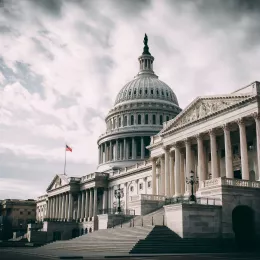Peter's Memo: Fighting for clearer food labels
Consumers have a right to know what’s in their foods and beverages. That’s why the Center for Science in the Public Interest, Nutrition Action’s publisher, has long fought for labels that tell the whole story.
Here’s the latest on our recent successes...and our fight against an industry ploy to thwart a new rule that protects the public’s health.
Alcohol
You can check any food label for calories as well as allergens and other ingredients. But when it comes to beer, wine, and distilled spirits, you’re often in the dark.
Back in 2003, CSPI and other health advocates petitioned the Treasury Department to require labels to disclose alcohol content, calories, and ingredients (including allergens). Nearly 20 years later, those labels still weren’t required.
So last October, CSPI, the Consumer Federation of America, and the National Consumers League sued the department for failing to act.
That did the trick.
In November, Treasury agreed to propose rules for mandatory labels. We’ll work to make those labels as useful as possible.
Front-of-pack labels
In the 1980s, CSPI led the fight for mandatory Nutrition Facts labels. Now we’re tackling the fronts of packages, which often display only rosy claims like “high protein” or “high in vitamin C.”
Canada, Chile, Israel, and other countries already—or will soon—require the fronts of packages to alert consumers when a food is “high” in saturated fat, sodium, or sugar.
In August, CSPI and other advocates petitioned the Food and Drug Administration to require similar front-of-pack labels, and in September, the White House asked the FDA to develop a front-of-pack labeling system.
Sesame

Many people who are allergic to foods live in fear that they’ll accidentally ingest some. Even a trace amount can be life-threatening if it triggers swelling that blocks airways.
So in 2021, CSPI successfully fought to pass a law that added sesame to the list of common allergens like peanuts, wheat, and milk, which must be disclosed on labels (with a phrase like “contains sesame”).
Starting this January, manufacturers were required to disclose sesame on labels and take steps to prevent sesame from accidentally contaminating their other foods.
In response, companies like Dave’s Killer Bread, Olive Garden, Culver’s, and Chick-fil-A (or their suppliers) started purposely adding sesame to foods and then disclosing it on the labels. That let them avoid taking steps to prevent accidental contamination.
Sadly, that leaves people who have sesame allergies with fewer foods that are safe to eat. And longtime customers with allergies may not notice that sesame has been added, putting them at risk of a dangerous reaction.
In late January, CSPI urged the FDA to declare the practice illegal under rules that require manufacturers to reduce food safety risks to their customers.
We’ll keep you posted.
Tags
Topics
The Latest by Peter
Mass layoffs at FDA will not make Americans healthier
Government Accountability

Trump administration firing of thousands of health agency employees will undermine food safety
Government Accountability

Stop the outbreaks of tomorrow by voting against Kennedy on Senate floor
Government Accountability

Senators must confront Kennedy on HHS ‘pause’ on health agency communications
Government Accountability

Government “pause” on health agency communications may threaten public safety
Government Accountability

More on government accountability
Mass layoffs at FDA will not make Americans healthier
Government Accountability

Trump administration firing of thousands of health agency employees will undermine food safety
Government Accountability

Stop the outbreaks of tomorrow by voting against Kennedy on Senate floor
Government Accountability

FDA proposes mandatory front-of-package nutrition labels
Food Labeling

Senators must confront Kennedy on HHS ‘pause’ on health agency communications
Government Accountability


